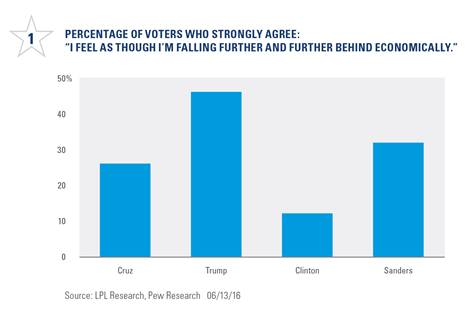Populist movements garner significant attention but their lasting impact is questionable at best. These movements have increased in strength both domestically and abroad but very few have won national elections. At most, their movements can influence larger, more mainstream parties, but many of their messages and proposed polices have rarely come to fruition. Potential implications of renewed populism include a greater likelihood of new fiscal policy, a higher risk premium placed on financial markets, and a move back to more central-leaning party tendencies after a decade of increasing polarization. At the extreme, a third political party in the U.S. may arise.
A voter rebellion of sorts propelled both Republican candidate (and current presumptive nominee) Donald Trump and former Democratic candidate Bernie Sanders to greater than expected popularity in the 2016 primary elections. Although Sanders is no longer a contender in the 2016 presidential candidate, both his and Trump’s relative, and surprising, popularity reveals changing attitudes and growing frustrations with life in America that extends beyond discontent with Washington. Such attitudes and feelings are not just a domestic phenomenon, as the recent “Brexit” vote illustrated overseas. The United Kingdom (U.K.) held a referendum on June 23, 2016, to vote if the country should remain or leave the European Union (EU). In a surprising and unexpected outcome, a slight majority of voters approved what is known as “Brexit.”
NOT THE FIRST TIME
Populist ideology is certainly not new and prior historical episodes share similarities with today’s movements. In the U.S., populism movements date back over 150 years. The Know-Nothing movement in the mid-1800s originated out of resentment toward immigrants and fears of being displaced in the workforce (sound familiar?). A religious element (native born Protestant versus predominantly Catholic immigrants) was also a factor. The movement led to the rise the American Party, which carried some states and major cities in the 1856 presidential election, but it failed to garner any notable power and dissolved.
In the late 1880s, frustrated farmers and workers’ unions that grew distrustful of capitalism led to the rise of the People’s Party. The party won roughly 8% of the popular vote in the 1892 election, won a small number of states in the process, and remained a presence in politics before fading in 1896. A faction of the People’s Party, led by William Jennings Bryan, would remain a voice among the Democratic Party through the early 1900s. Bryan campaigned for President but failed again on his third and last attempt in 1908. Nonetheless, populist themes would influence, but not dominate, the Democratic Party in subsequent decades.
TODAY'S PARALLELS
Unsurprisingly, both Trump and Sanders supporters exhibit strong dissatisfaction with the economy, consistent with prior bouts of rising populist sentiment. During the primary election season, each candidate ranked highest in the percentage who responded “strongly agree” to the statement, “I feel as though I’m falling further and further behind economically,” in a recent poll by the Pew Research Center [Figure 1].
Supporters of each also stand out relative to other candidates in their belief that “the old way of doing things no longer works and we need radical change,” with 55% of Trump supporters agreeing and Sanders not far behind at 41%. Frustration with the economy runs higher with Republicans generally, according to Pew, but Trump and Sanders stood out notably versus the other candidates.
ECONOMIC DISSATISFACTION
Economic frustration is common among younger voters who are upset with what they view as a lack of professional opportunities in the economy. Younger voters believe that income inequality is a major problem where the benefits of the economic recovery in recent years accrued mostly to those at the top of the income ladder. Sanders’s economic views seemed to capture younger voters’ frustrations, which were a clear driver of his popularity [Figure 2]. This younger generation is also saddled with the largest student debt burden of any generation and has put off marriage or buying a house partly in response to financial burdens. A sluggish economic recovery has made this angst linger and grow in intensity.









